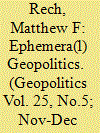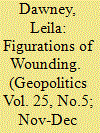|
|
|
Sort Order |
|
|
|
Items / Page
|
|
|
|
|
|
|
| Srl | Item |
| 1 |
ID:
175329


|
|
|
|
|
| Summary/Abstract |
This special issue presents a challenge to the division of critical geopolitics that has come to frame the sub-discipline. Instead of thinking about popular geopolitics as the way in which geopolitical practice escapes the formal realms of statecraft, academia and think-tanks, Woodyer and Carter, and the other contributing authors here, suggest we instead reframe our inquiry around the domestication of geopolitics. Woodyer and Carter suggest that this responds to recent moves within critical geopolitics to go beyond the discursive to reformulate geopolitics as “an encounter between texts, objects, bodies and practices”. It challenges the intentionality of representations sometimes assumed by popular geopolitics where the “agency of cultural producers has been prioritised over that of audiences, that textual and discursive methods have been prioritised over more embodied and affective approaches” – leaving more openness for play and mis-/re- interpretation – and it challenges the privileging of certain sites (most notably, different forms of mass media) that have tended to dominate this approach since its inception.
|
|
|
|
|
|
|
|
|
|
|
|
|
|
|
|
| 2 |
ID:
175324


|
|
|
|
|
| Summary/Abstract |
In this paper, we take the emergence of the Her Majesty’s Armed Forces toy range in 2009 as a starting point for thinking through the domestication of geopolitics through practices of play. Empirically, the paper draws upon substantive, innovative and original research undertaken with children in their homes, via a series of play ethnographies; conceptually, the paper draws upon the notion of ‘domestication’ and argues that ideas from these literatures might be usefully adopted as a means of reconfiguring popular geopolitics. In so doing, we argue not only that toys, games and play warrant much greater attention as forms of popular geopolitics, but also that the idea of domestication has much to offer wider conceptions and framings around popular geopolitics itself. The paper thus advances claims for a significant reformulation of popular geopolitics as an encounter between texts, objects, bodies and practices. More specifically, the rich ambiguity of the observed practices emerging from our play-centred ethnographic approach speaks clearly to the need to avoid prioritising the public over the private, cultural producers over audience, and the discursive over the affective in our theorisations of domestication. While we should be attentive to the highly orchestrated practices of anticipating domesticity and the multiple sites of geographical production assembled though these practices, we should not ignore the excess inherent within the incomplete, experimental process of domestication.
|
|
|
|
|
|
|
|
|
|
|
|
|
|
|
|
| 3 |
ID:
175325


|
|
|
|
|
| Summary/Abstract |
This paper explores contemporary cultures of British military recruitment and considers the domestication of geopolitics as matters of the ephemeral (fleeting, sensory encounters), and of ephemera (everyday objects). It employs an auto/ethnographic approach toward spaces critical to recruitment – the airshow, the home and the body. Three central contributions are developed: first, building on a recent turn to the material in political geography, the paper argues that taking seriously materiality, objects, and ‘stuff’ enhances our understanding of the connections between geopolitical, militarised and everyday; second, deploying a notion of the geopolitical social, it explores the geopolitical as it is situated in everyday lives and spaces; third, it investigates the tendency for militarised objects to find their way onto and around bodies and into domestic spaces. Set at the interface of literatures in critical geopolitics and critical military studies, the paper concludes that material encounters and everyday objects are matters central to the business of geopolitics and militarism.
|
|
|
|
|
|
|
|
|
|
|
|
|
|
|
|
| 4 |
ID:
175328


|
|
|
|
|
| Summary/Abstract |
This paper discusses the family as a site of geopolitics. Bridging scholarship in feminist geopolitics, political psychology and sociology, we explore the psycho-social dynamics of family life and theorise the family as a multi-scalar, relational site of security. Original data collected with ethnic and religious minority youth in Scotland are presented alongside an analysis of how family relations, at interconnected scales, mitigate against and/or re-inscribe broad geopolitical narratives of security. We employ the concept of ontological security (OS) to analyse the role of the family, and the relationships within it, on shaping youth securities. We discuss (1) how family histories and intergenerational experience shape young people’s sense of security; (2) how young people negotiate and resist family norms and values that reproduce securitizing geopolitical narratives; and (3) how young people find security when family is absent or indeterminate. In each case, we analyse how geopolitics operates through family life. The paper makes two key contributions: first, we use original empirical data to theorise ethnic and religious minority youth securities; second, we show the value of OS as a conceptual tool for understanding psycho-social dimensions of familial geopolitics.
|
|
|
|
|
|
|
|
|
|
|
|
|
|
|
|
| 5 |
ID:
175326


|
|
|
|
|
| Summary/Abstract |
This article argues that the figures of the wounded and dead soldier are central organising nodes in public objects, events, and institutions and are generative of intense affects and feelings, which are in turn bound to and constitute geopolitical imaginaries. Through these figurations, bodies of wounded and dead soldiers are brought to visibility, becoming key technologies for the production of authority and attachment, and fostering powerful affective responses in publics that work to amplify and enliven particular forms of neoliberal militarised nationhood.
|
|
|
|
|
|
|
|
|
|
|
|
|
|
|
|
| 6 |
ID:
175322


|
|
|
|
|
| Summary/Abstract |
Well before the COVID-19 pandemic, the United States might have been described as a country collapsing in on itself, defined by deep chasms in wealth and political ideologies. While divisions and inequalities pre-existed the Trump presidency, the rise of support for nationalism has only grown. This nationalism has been bolstered by an unexamined notion of American exceptionalism and militant individualism.
|
|
|
|
|
|
|
|
|
|
|
|
|
|
|
|
| 7 |
ID:
175323


|
|
|
|
|
| Summary/Abstract |
The papers that make up this special section on ‘domesticating geopolitics’ initially arose from a double session around this theme from the RGS-IBG Annual Conference held at the University of Exeter, UK, in September 2015. Those sessions, in turn, arose as a means of exploring a key theme that was emerging within our Ludic Geopolitics research project; how to think through the largely domestic geographies of children’s play in relation to wider geopolitical events. As we outline in more detail in our paper in this issue, our research was concerned with a specific toy range (the Her Majesty Armed Forces action figure range) that emerged in a specific place (the UK), and at a specific time (whilst UK military action was ongoing in Iraq and Afghanistan). However, the question of how to theorise and conceptualise the entangled relationship between the domestic and the international is of course, a much wider problematic. The impetus behind the conference sessions was to begin a dialogue with others who, whilst working in different empirical settings, were nevertheless grappling with some of these same issues.
|
|
|
|
|
|
|
|
|
|
|
|
|
|
|
|
| 8 |
ID:
175327


|
|
|
|
|
| Summary/Abstract |
This paper explores the relationship between domestic violence and rurality through the theoretical lens of intimate war. It argues for a geopolitical perspective that foregrounds issues of space and scale and emphasises the ‘entwined geographies of corporality and violence’. Drawing on recent empirical research in the UK, I explore the ways in which the body is contained and controlled both physically and emotionally through intimate war. In doing so I focus on three key aspects of domestic violence: hidden geographies, tactics of entrapment and surveillance and the wounding of the body. The context of rurality provides a set of spatial and social characteristics that need to be taken into consideration in understandings of the experience of domestic violence and the responses by agencies and professionals.
|
|
|
|
|
|
|
|
|
|
|
|
|
|
|
|
| 9 |
ID:
175330


|
|
|
|
|
| Summary/Abstract |
Wakhan, northeast Afghanistan’s peripheral panhandle, is situated between Afghanistan’s borders with Tajikistan, China and Pakistan. Once subject of Great Game rivalry, it requires multiagency fieldwork to better understand its geopolitical vulnerabilities. Existing accounts of Wakhan are deemed inadequate and inappropriate, exceptionalising its wildness and wilderness, and drawing (in)civility distinctions that legitimise a near-divine right to dominion. Reassessing Wakhan in a boundary biography, the paper argues that by conceiving boundaries as local manifestations of international dynamics, marginal boundary regions can serve as tests for the ‘state’ of international affairs. The paper firstly assesses evolving understandings of boundaries before conceiving them as local manifestations of international dynamics. Existing narratives are then observed to render the region subaltern.
|
|
|
|
|
|
|
|
|
|
|
|
|
|
|
|
|
|
|
|
|